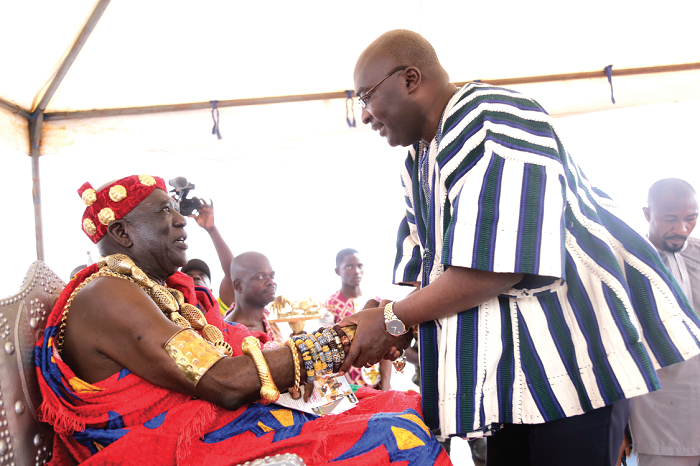
Increase tourism’s contribution to national growth
The Vice-President, Dr Mahamudu Bawumia, has challenged stakeholders in the tourism industry to do more to increase the contribution of the sector to national development.
Dr Bawumia threw the challenge when he addressed a durbar of the chiefs and the people of the Oguaa Traditional Area to climax this year’s Fetu Afahye in Cape Coast last Saturday.
The celebration was on the theme: “Restoration of our Heritage: A key to tourism and Development”.
In spite of an abundance of resources, the contribution of the tourism sector to Ghana’s Gross Domestic Product (GDP) has been relatively minimal, with direct and indirect contributions accounting for between three and seven per cent in 2016.
In terms of employment, travel and tourism supported about 288,000 direct jobs and 405,000 indirect jobs in 2016.
Citing figures from other countries to support his call for greater action in the tourism sector, Dr Bawumia said although growth in the sector had been remarkable so far, there was a lot of room for improvement.
“Tourism is the fourth highest income earner in this country. However, in terms of contribution to national output, Ghana ranked 101 in 2016 among a group of 185 countries. In terms of contribution to employment, Ghana ranked 49th. But Ghana ranked 113th (out of 185) in terms of our ability to attract tourism investment, compared to Kenya, which ranked 73rd,” he said.
That meant that travel and tourism were not contributing to growth as much as they could, he pointed out, adding: “We are operating below our potential. In terms of contribution to GDP growth in 2017, Ghana ranked 67th, compared to Kenya’s 46th and Senegal’s 14th on a global scale.”
“The message is clear — there is more head room to add to our travel and tourism industry, but we have to work harder if we are to create jobs, drive cultural exports and generate local prosperity through our heritage values and environmental tourism,” the Vice-President emphasised.
Cape Coast
Zeroing in on Cape Coast and its environs, arguably one of Ghana’s main tourism hubs, with its beaches, slave castles and other monuments, Dr Bawumia said residents of the area would reap the full benefits of those tourist attractions when conscious efforts were made to improve sanitation, security and the quality and standard of service offered in hotels and restaurants.
“The hospitality industry must live above reproach to deliver satisfactory services to our tourists. Hotel services must be improved to meet international standards. Our bar and restaurant attendants must be given the needed soft skills training to make them competitive in the delivery of services,” he urged.
Development resource
Reflecting on the theme for the celebration, Dr Bawumia urged the organisers of the festival, as well as the country’s traditional leaders, to take advantage of such occasions to plan for the future development of their communities.
“Let us remind ourselves that festivals themselves are like any resource which can be used to develop our communities, as tools of job creation and export promotion, as a means to promote tourism and attract investments into our cultural industry,” he said.
He said in many parts of the world, festivals were at the forefront of wealth and employment creation, as well as the promotion of the artistic talents of the people.
“Let us commit to do even better next year everything we are doing well in this year’s festival. Let us challenge the creativity and artistic talents of the youth to enhance the heritage value of the festival,” the Vice-President urged.
Osabarimba Kwesi Atta
For his part, the Omanhen of the Oguaa Traditional Area, Osabarimba Kwesi Atta II, appealed to the government to give special consideration to students from the region who passed the Basic Education Certificate Examination (BECE) and chose senior high schools (SHSs) in the traditional area.
He said the schools were built on the land of the traditional area and it was only fair that children from the area gained admission to those schools.
He applauded the government for introducing the double-track system to deal with the infrastructural deficit in SHSs.
He, however, urged it to run proper education on the new system, noting that many people did not know how it was going to work, for which reason they were opposing it.
“I believe if they fully understand it, they will support it,” he stressed.
Other festivities
Before the durbar, there was a procession of the chiefs and the Asafo companies, in their regalia, through the principal streets of Cape Coast from the Mfantsipim School Junction to the Victoria Park (Jubilee Park).
The festivities marking the festival began last Monday night with some traditional rites beside the Fosu Lagoon, followed by a regatta and a Cape Coast version of the Bakatue to lift the ban on fishing in the lagoon.
Revellers from all over the country and abroad who thronged Cape Coast to be part of the celebration filled the various pubs and other entertainment centres in the metropolis.
